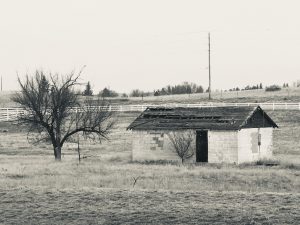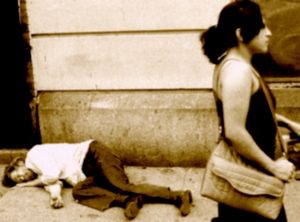The Shack
Not far from my home, in the center of an open field, sits a dilapidated shack. The roof is caving in. The doors have fallen off. Each passing prairie storm beats it down a little more.
I drive by it often. It always reminds me of the best-selling book “The Shack” and its gripping story of a bereaved father. The “shack” is both literal: the scene of his beloved young daughter’s murder; and figurative: the metaphor of a wounded human soul. God meets him in that place of devastation, then leads him on a soul-searching journey through the heartache to the healing.
Lately, I’ve felt like I’ve been in the shack with God. My job as a Client Advocate at our local pregnancy center has been tough this past year. The cumulative effects of stressors in my personal life, changes at the center, and clients in crisis eventually took their toll. My roof began to leak and my doors became unhinged. Each pounding storm beat me down a bit more, until I found myself broken down.
Emotionally exhausted. Weary of the work. Numb.
“I’m tired,” I heard myself say on more than one occasion on the job. I was getting plenty of sleep. This was a different kind of weary. A bone-weariness.*
There’s a name for this condition: Compassion Fatigue. I’m familiar with this term. I even taught our new staff about it. But I missed its warning signs in my own life.
Compassion Fatigue is a threat to first responders, medical personnel and caregivers alike. Anyone in close contact with suffering is vulnerable. Even cold-hearted attorneys can fall victim to it! (Sorry, Chris.)
The point is, the Helpers are now in need of Help.
“Self care = Client care,” I taught our trainees. It’s not selfish to take care of one’s self. “Put your oxygen mask on first,” flight attendants instruct their passengers. Then you can assist others.
Because what aid can we render if our own roofs are sagging and in need of repair? Not much. How can we nurture others if our own cells are depleted and oxygen-deprived? Not well.
I now have a new mantra. I prefer this one to “self care.”
Soul care.
The shack is a symbol of our soul. If we’re not careful, the stresses and storms of life can take a toll on our soul. Weighed down, beaten down, we can no longer echo the hymn writer’s refrain: “It is well with my soul.”
But into the ruins, the Triune God comes. He pulls us out of the rubble, soothes our damaged emotions and bandages our wounds. He helps us confront our fears and confess our failures. He teaches us valuable lessons.
It’s not always pleasant, this soul-revealing, soul-healing journey. But it is necessary. And it is good.
He is a Good Shepherd.
He is restoring my soul.
He will restore yours too.
He makes me lie down in green pastures; He leads me beside quiet waters. He restores my soul… Psalm 23:2-3a, NASB
*I recently learned that “bones” in the Bible are symbols of our inner being. Cool, huh? (Source: The Passion Translation note on Psalm 31:10.)
Note: I hope to share more of my story of restoration in future posts. So stay tuned…


